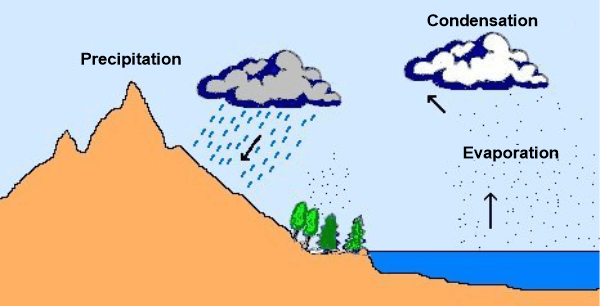Condensation DefinitionCondensation refers to the process by which a gas changes into a liquid. It occurs when the temperature of a gas decreases or when the pressure on the gas increases. During condensation, the molecules of a gas lose energy and come closer together, forming a liquid. 
Condensation is a crucial component of the water cycle, also known as the hydrologic cycle. The water cycle describes the continuous movement of water on, above, and below the Earth's surface. In the water cycle, water evaporates from oceans, lakes, and other bodies of water into the atmosphere as water vapor. This water vapor then rises and cools, leading to condensation and the formation of clouds. Clouds are collections of tiny water droplets or ice crystals suspended in the atmosphere. Clouds form when air rises and cools to the point where the water vapor in the air condenses into tiny droplets. The size and type of cloud depend on the temperature, pressure, and humidity of the atmosphere. Condensation also plays a key role in many industrial and technological processes. For example, condensation is used in the production of distilled spirits such as whiskey and rum. In this process, alcohol vapor is produced by heating fermented liquid, and then the vapor is condensed into a liquid form by cooling it. Condensation is also used in air conditioning and refrigeration systems. In these systems, refrigerant gases are compressed and cooled, causing the refrigerant to condense into a high-pressure, high-temperature liquid. This liquid is then expanded, lowering its temperature and pressure, which allows it to absorb heat from the surrounding air. The refrigerant then evaporates back into a gas, completing the cycle. Application of condensationCondensation has a wide range of applications in various fields including: 1. Refrigeration and air conditioning In these systems, refrigerant gases are compressed and cooled, causing the refrigerant to condense into a high-pressure, high-temperature liquid. This liquid is then expanded, lowering its temperature and pressure, which allows it to absorb heat from the surrounding air. The refrigerant then evaporates back into a gas, completing the cycle. 2. Distillation Condensation is used in the production of distilled spirits such as whiskey and rum. In this process, alcohol vapor is produced by heating fermented liquid. The vapor is then condensed into a liquid form by cooling it. 3. Power generation In power plants, steam is generated by heating water, which then drives turbines to generate electricity. The steam is then condensed back into water for reuse in the heating process. 4. Desalination Condensation is used in the process of desalination to purify saltwater. In this process, saltwater is heated to produce steam, which is then condensed into pure water. 5. Industrial processes Condensation is used in various industrial processes, including the production of chemicals, pharmaceuticals, and petroleum products. 6. Cooling systems Condensation can also be used in cooling systems, such as refrigerated trucks and containers, to regulate the temperature and prevent spoilage of perishable goods. However, condensation can also have negative effects. For example, condensation on windows and other surfaces in buildings can lead to mold growth and other problems. In addition, condensation can cause corrosion in pipes, particularly in heating and cooling systems, by promoting the growth of bacteria and other microorganisms. To prevent these negative effects, it is important to properly maintain and manage systems that use condensation. ConclusionIn conclusion, condensation is a process that plays a vital role in natural and man-made systems, including the water cycle, industrial processes, and air conditioning and refrigeration systems. While it has many benefits, it can also have negative effects if not properly managed. Therefore, understanding the mechanisms and implications of condensation is important for a wide range of fields and applications.
Next TopicContract Definition
|
 For Videos Join Our Youtube Channel: Join Now
For Videos Join Our Youtube Channel: Join Now
Feedback
- Send your Feedback to [email protected]
Help Others, Please Share









